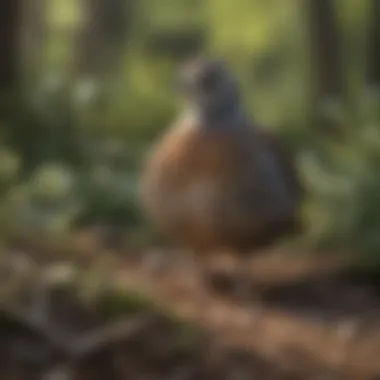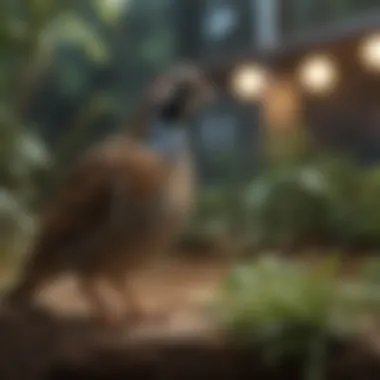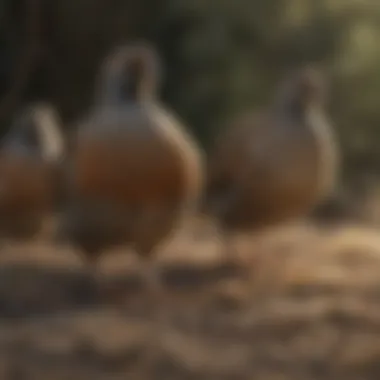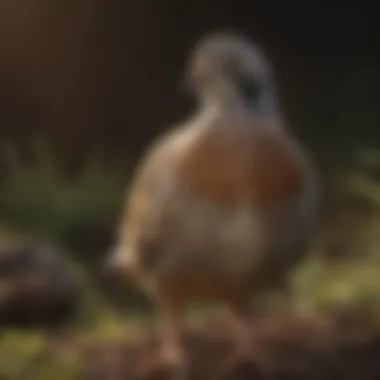Exploring Bob White Quail: Care, Sources, and Purchase Options


Intro
Bob White Quail, known for their distinctive calls and compact size, are increasingly becoming popular among pet owners and game bird enthusiasts alike. Their lively nature and relatively easy care requirements make them an appealing choice for many. However, potential owners must gather comprehensive information before making a purchase. This article aims to dissect the essentials of keeping Bob White Quail, focusing on their care needs, local purchasing options, and more.
Grooming Techniques
When it comes to the care of Bob White Quail, grooming plays a surprisingly significant role, especially in maintaining their overall well-being. While quail do not require extensive grooming as some other pets might, there are essential practices that owners should be familiar with.
Basic Grooming Tools
To ensure proper care for your Bob White Quail, consider having the following grooming tools:
- Small brushes: These can help remove loose feathers or dirt that might accumulate.
- Nail clippers: Keeping their nails trimmed prevents potential injuries and helps maintain their comfort.
- Clean bedding: Regular replacement of bedding is essential for hygiene.
Step-by-Step Grooming Guides
- Feather Care: Gently brush feathers with a small brush to remove debris.
- Nail Trimming: Carefully trim nails a little at a time to avoid cutting too close to the quick.
- Housing Maintenance: Change bedding weekly to keep the living area clean and prevent odor.
Breed-Specific Grooming Needs
Bob White Quail generally do not require extensive grooming. However, keeping their habitat clean should be prioritized. Regular checks for mites or other pests are also essential to maintain their health.
Health and Wellness
Ensuring the health and wellness of your Bob White Quail is paramount. Their diet, common health issues, and regular check-ups contribute significantly to their quality of life.
Nutrition and Diet Tips
Feeding your Bob White Quail a balanced diet is crucial. Their diet should primarily consist of:
- High-quality game bird feed
- Fresh greens such as clover and dandelion leaves
- Occasional grains like millet and oats
Common Health Issues and Solutions
Owners should be aware of potential health issues, including:
- Respiratory Diseases: Often caused by poor ventilation. Ensure proper air circulation in their habitat.
- Obesity: Keep an eye on their feeding to prevent excess weight gain, which can lead to other health problems.
- Mites and Lice: Regularly check for signs and treat promptly with appropriate remedies.
Importance of Regular Check-Ups
Routine veterinary visits can help catch any health issues early. Regular check-ups ensure your quail remains healthy and vibrant. Always seek a vet familiar with avian species for the best care.
Training and Behavior
Training Bob White Quail may seem unconventional, but positive interaction can enhance their behavior and bonding with you.
Basic Training Commands
Start with straightforward commands like:
- Come: Encourage your quail to approach for treats.
- Stay: Help them learn to remain still when needed.
Understanding Common Behavioral Issues
Be aware of common challenges like:
- Feather Plucking: Often a sign of stress or boredom; environments should be stimulating.
- Excessive Vocalization: Can indicate discomfort or unease; monitor their living conditions.
Techniques for Effective Training
Training can include using treats for rewards, and being patient and consistent is key. Spend time daily interacting with your quail to build trust and encourage positive behavior.
Community Insights
Connecting with fellow quail enthusiasts can provide valuable insights and support.
User-Submitted Tips and Tricks
Utilize online platforms such as Reddit or Facebook groups where owners share their experiences and tips. You can learn a lot from the community about specific care strategies or problem-solving methods.


Real-Life Grooming Experiences
Taking part in discussions with other owners about their grooming routines can lead to customized care techniques that fit your lifestyle.
Expert Guest Contributions
Occasionally, engaging with professionals in webinars or local classes can enhance your understanding of Bob White Quail. Seek out expert opinions to stay informed about the best care practices.
Having reliable sources for information and connecting with the quail owner community can tremendously benefit your journey.
Prologue to Bob White Quail
Bob White Quail holds significant value for both enthusiasts and casual keepers alike. This section sets the stage for understanding the various aspects of Bob White Quail, emphasizing their appeal, care requirements, and purchasing sources. In a world where sustainable practices are increasingly prioritized, learning about Bob White Quail can enhance one’s appreciation for aviculture and wildlife management.
Understanding the Bob White Quail
Bob White Quail, known scientifically as Colinus virginianus, are small, ground-dwelling birds. They are characterized by their distinctive features, including a strikingly patterned plumage and a distinctive call. Their natural habitat spans the southeastern United States, where they thrive in open grasslands and brushy areas.
Bob Whites are social creatures, often found in coveys. These familial groups provide safety in numbers and allow them to communicate effectively with one another. Understanding their natural behaviors and social structures is crucial for those considering them as pets or for game purposes. They are not just picturesque birds but also exemplify complex social interactions that can be fascinating to observe.
Why Consider Bob White Quail?
There are several reasons to consider bringing Bob White Quail into your life. First, they are known for their unique contributions to the ecosystem, particularly in controlling insect populations. Their diet primarily consists of seeds, grains, and insects, making them valuable in pest management.
Additionally, raising Bob White Quail can provide an educational experience. Observing their behaviors and care requirements can teach a great deal about aviculture and nature conservation. For culinary enthusiasts, Bob White Quail also present an opportunity; their meat is rich in flavor and often sought after in gourmet cooking.
Furthermore, these birds can adapt well to domestication. However, it is essential to consider their specific needs and ensure you are equipped to provide a proper living environment. Overall, Bob White Quail can offer both practical and aesthetic benefits, making them a worthy consideration for many animal lovers.
Natural Habitat and Behavior
Understanding the natural habitat and behavior of Bob White Quail is crucial for potential owners. This knowledge helps to replicate their environment, ensuring their comfort and well-being. Given that these birds are wild by nature, awareness of their living conditions aids in creating suitable habitats that mimic their native surroundings. Having a grasp of their behavioral traits also contributes to proper handling and socialization in captivity.
Native Range and Lifestyle
Bob White Quail are prevalent across the eastern United States, extending into parts of Mexico and Canada. They typically prefer open fields, grasslands, and agricultural landscapes that provide both cover and food sources. Their affinity for these habitats highlights their reliance on vegetation for shelter and foraging.
These birds exhibit a ground-dwelling lifestyle. They spend most of their time foraging for seeds, insects, and other small food items. Observing their natural tendencies can help owners provide adequate enrichment. For example, creating grassy areas and mixed habitat spaces can mimic their natural setting. Additionally, they prefer to travel in coveys, which are small flocks. This social behavior indicates that keeping more than one quail may be beneficial for their mental health.
Maintaining their natural lifestyle is essential for successful quail ownership. Understanding their space needs and habits enhances their quality of life in captivity.
Social Structure and Communication
Bob White Quail have a unique social structure that fosters cohesion within their groups. They are known for their covey system, which consists of a small group of birds that band together for safety and companionship. This organization is not just vital for protection against predators but also plays a role in their mating habits and raising young.
Communication among these birds predominantly occurs through a series of calls. Their distinctive
Benefits of Owning Bob White Quail
Owning Bob White Quail can be rewarding for both personal enjoyment and practical purposes. Understanding the benefits helps potential owners make informed decisions. This section discusses outdoor enrichment, pest control, culinary uses, and hunting aspects related to Bob White Quail ownership.
Outdoor Enrichment and Pest Control
Bob White Quail provide significant outdoor enrichment. They have a natural behavior of foraging that can enhance the atmosphere in your yard or farm. These birds are lively and curious, exploring their surroundings. Watching them can give a sense of connection to nature. They interact with their environment, creating a lively ecosystem.
Beyond enrichment, they also serve as an effective pest control solution. Bob White Quail consume insects like beetles and grasshoppers. By managing these pests naturally, they can contribute to the health of your garden or lawn. For owners looking for sustainable options, keeping quail could reduce reliance on chemical pesticides. This trait is valuable for maintaining the ecological balance in your environment.
“Bob White Quail not only enrich your surroundings but also help control pests efficiently.”
Another advantage of raising Bob White Quail is their low maintenance. They do not require elaborate housing compared to other birds. A simple, secure enclosure will suffice. This characteristic makes them ideal for both novice and experienced bird owners.
Culinary Uses and Hunting
Bob White Quail have culinary significance as well. They are prized in various cooking styles for their distinct flavor. Many chefs appreciate their tender meat, which is often described as flavorful and lean. Cooking options include roasting, grilling, or even as a specialty in gourmet dishes.
Hunters also see value in Bob White Quail. They offer engaging and dynamic hunting experiences. These birds are known for their fast, unpredictable flight patterns. This challenge appeals to many sport hunters. Quail hunting can be a social activity, bringing friends and families together in the pursuit of wildlife.
Besides recreational hunting, legal regulations must always be considered. States may have specific seasons and bag limits for hunting quail. Knowledge of these laws is essential to ensure responsible practices.
In summary, the benefits of owning Bob White Quail are notable. They offer outdoor enrichment, contribute to natural pest control, and provide culinary delights. Both for personal enjoyment and practical applications, they represent a thoughtful choice for potential bird owners.
Factors to Consider Before Purchase


When considering the acquisition of Bob White Quail, there are several essential factors to evaluate. Understanding these aspects ensures not only the well-being of the birds but also a fulfilling experience for the owner. This section delves into the key considerations that can significantly influence your decision.
Space Requirements
Having ample space is crucial for the health and happiness of Bob White Quail. These birds thrive in a secure, spacious environment where they can roam freely. Ideally, a minimum of 10 square feet per bird is recommended if they are housed outdoors. In addition to tempering stress levels, sufficient space facilitates natural behaviors, such as foraging and social interaction.
Consider the layout of the space, making sure it includes areas for shelter and protection from predators. Enclosures should be sturdy with adequate ventilation. A well-structured habitat contributes immensely to the quail's quality of life.
Climate Adaptation
Bob White Quail are quite resilient, yet their need for a suitable climate cannot be overlooked. These birds can adapt to a range of temperatures, but extremes can cause stress and health issues. During hotter months, shade and water must be provided to prevent overheating. Conversely, in colder climates, adequate heating sources and insulation are vital.
In regions prone to heavy rainfall, ensure the shelter has proper drainage to keep the habitat dry. Familiarizing yourself with the local climate conditions and how they may affect your birds is an important step in their welfare.
Legal Considerations
Before acquiring Bob White Quail, understanding the legal implications is paramount. In various regions, there might be restrictions on ownership, breeding, or selling of quail. Research your local laws and regulations thoroughly to ensure compliance. Some states require permits for owning these birds, especially if they are to be used for hunting purposes.
In addition, consider the impact of local wildlife laws on their habitat and breeding. Staying informed about local ordinances helps you avoid potential legal complications down the line.
Owning Bob White Quail can be rewarding, but thorough preparation and understanding of these factors are essential for success.
Evaluating these important factors before making a purchase will help prospective owners ensure that they are fully equipped to provide a nurturing and fulfilling environment for their Bob White Quail.
Where to Find Bob White Quail for Sale
Locating Bob White quail for sale is a critical aspect for anyone considering adopting this unique species. Understanding where to find them not only saves time but also ensures that you purchase healthy and well-cared-for birds. This section highlights several options, addressing the benefits and essential considerations relevant to each option.
Local Breeders and Farms
Local breeders and farms are often the best sources for acquiring Bob White quail. These establishments typically specialize in raising birds in controlled environments, focusing on their health and genetics. When sourcing from local breeders, one major advantage is the opportunity to inspect the birds firsthand. You can observe their overall health, age, and behavior before making a commitment.
Here are some key points to consider when choosing local breeders:
- Reputation: Research the breeder or farm’s reputation through reviews and recommendations from previous customers. Look for testimonials that vouch for the health and quality of their birds.
- Breeding Practices: Inquire about their breeding practices to ensure the welfare of the birds. Responsible breeders maintain appropriate habitats and are knowledgeable about the species.
- Variety: Local farms may offer various subtypes of Bob White quail, broadening your options.
Taking the time to visit local breeders not only aids in finding healthy quail but also opens the door to valuable advice on care and maintenance from experienced owners.
Online Marketplaces
Online marketplaces offer a convenient option for those seeking Bob White quail. Platforms like Craigslist or specific bird-breeding websites have listings from various sellers throughout the country. However, there are both pros and cons to consider with this method.
Pros
- Accessibility: Availability of options regardless of your location.
- Comparative Shopping: Easily compare prices from multiple sellers.
- Detailed Listings: Many sellers provide details and photos of the quail.
Cons
- Risk of Scams: Be cautious of sellers who lack reviews, as online platforms can sometimes harbor fraudulent listings.
- Shipping Concerns: Consider the stresses involved in shipping live birds. Make sure the seller uses safe shipping methods or offers local pickup.
Overall, online marketplaces can expand your search range effectively, but due diligence is necessary before purchasing.
Local Pet Stores and Auctions
Local pet stores and auctions can be additional sources for Bob White quail. While pet stores may not always have quail in stock, they can occasionally offer them, particularly stores that specialize in birds.
Advantages of Pet Stores and Auctions:
- Local Availability: These sources often provide opportunities to see the birds before buying.
- Immediate Acquisition: You can take the pet home upon purchase without waiting for shipping.
- Wide Variety: Auctions can offer diverse choices, sometimes at lower prices.
Considerations:
- Bird Health: Ensure the store or auction house maintains standards for care. Inspect the birds for signs of illness or poor conditions.
- Knowledgeable Staff: Engage with staff to assess their knowledge about caring for Bob White quail. Their expertise could provide valuable insights.
Ultimately, local pet stores and auctions can be a viable route, although careful evaluation of both the birds and selling practices is still essential.
Always prioritize the health of the quail you wish to purchase. Making informed decisions fosters a better environment for their well-being.
Evaluating Breeders and Sellers
Evaluating breeders and sellers is central to ensuring you procure healthy and well-cared-for Bob White Quail. The right source can significantly affect not only the health of the birds but also your experience as an owner. It is vital to consider several elements before making a purchase, as they can influence the long-term welfare of your quail.


Reputation and Reviews
When choosing a breeder or seller, reputation plays a crucial role. Researching consistent feedback from previous customers can provide insights on the quality of birds and the seller's practices. Seek out reviews on platforms like Facebook or Reddit to gather authentic experiences from other buyers. A solid reputation often indicates a commitment to ethical breeding and care.
- Consider factors such as:
- Response time to inquiries
- Quality of customer service
- Transparency in operations
By focusing on these aspects, you can make a more informed decision about where to purchase your quail. Sellers with positive reviews tend to be more invested in the welfare of their birds, translating into healthier quail for your home.
Health and Condition of Birds
Paying attention to the health and condition of the birds is equally important. A responsible breeder will prioritize health indicators when selling quail. Before purchasing, ask to see the actual birds. Look for signs of health, such as clear eyes, clean feathers, and active behavior.
Inquire about:
- Vaccination status
- Recent health checks
- Parasitic treatments
Ensuring that the quail come from a healthy background can prevent future health complications and ensure a thriving environment. Healthy birds are essential for both enjoyment and practicality, especially if you intend to use them for game or culinary purposes.
Ethical Practices
Ethical practices in breeding and selling Bob White Quail also warrant careful consideration. It is crucial to support breeders who prioritize animal welfare. Ask about their breeding conditions. Birds should have adequate space and a proper environment that mimics their natural habitats.
Look for:
- Breeding methods that do not prioritize profit over welfare
- Transparency in breeding conditions
- Commitment to humane practices
Many reputable breeders will be open about their practices and expectations. Ensuring ethical standards is not only beneficial for the quail but elevates the entire experience of ownership.
Tracking down a responsible breeder lays the groundwork for a positive and rewarding experience in owning Bob White Quail.
Care and Maintenance of Bob White Quail
Caring for Bob White Quail is essential for their well-being and longevity. Whether kept as pets or for game, these birds require specific care and maintenance practices. Understanding their needs helps ensure a healthier and more productive environment.
Housing and Shelter Requirements
Bob White Quail need a proper living space to thrive. They require a secure enclosure with enough room to move freely. A minimum space of 10 square feet per bird is recommended to allow natural behavior. The enclosure should have solid walls, to protect quail from predators. Additionally, proper ventilation is important to avoid moisture build-up and maintain air quality.
Provide nesting areas using straw or hay. This gives them comfort and security. Ensure that the housing area is clean and dry. Regular cleaning prevents diseases and parasites. A shaded area within the enclosure is crucial to protect them from extreme weather conditions.
Nutrition and Feeding Guidelines
Feeding Bob White Quail appropriately is vital for their growth and reproduction. A balanced diet should include high-quality game bird feed, which contains sufficient protein and nutrients. Supplement this with whole grains, seeds, and greens. Fresh fruits and vegetables can be added occasionally for variety. It is also essential to provide access to clean water at all times.
Be aware of the feeding schedule. Quail usually eat several small meals throughout the day. Ensuring they have access to food and water during the day is important. It helps in maintaining their energy levels and overall health.
Health Monitoring and Veterinary Care
Regular health monitoring is necessary to detect any potential problems early. Watch for signs of illness, including lethargy or changes in appetite. Keeping a close eye on their droppings can also provide information about their health.
Routine veterinary care is advisable. A vet specializing in avian species can offer vaccinations and regular health check-ups. Early interventions prevent diseases from spreading within your flock. Have a plan for emergencies, identifying a veterinarian who can respond quickly if needed.
Regular monitoring and veterinary care can significantly enhance the quality of life for your Bob White Quail.
In summary, proper care and maintenance of Bob White Quail involve ensuring suitable housing, nutrition, and health care. Understanding these aspects will lead to happier, healthier birds and a more rewarding experience for the owner.
Ending
Owning a Bob White Quail can be a rewarding experience. This article highlights several key elements to consider for current and future pet owners.
First, it is essential to understand the unique care needs of Bob White Quail. From housing to nutrition, each aspect plays a significant role in ensuring the health and well-being of these birds. The right environment, adequate space, and proper dietary planning are critical.
Secondly, responsible sourcing of Bob White Quail cannot be overlooked. Potential buyers should explore various avenues including local breeders, online platforms, and pet stores. Evaluating the reputation and practices of these sources ensures that you obtain healthy birds while supporting ethical standards in the industry.
Furthermore, understanding the behavior and social structure of Bob White Quail is fundamental for successful integration into your home. Awareness of their need for social interaction and appropriate environments can help in fostering a nurturing habitat.
Overall, approaching the ownership of Bob White Quail with thorough preparation and knowledge will enhance both the well-being of the birds and the satisfaction of the owner. As you embark on this journey, keep these elements in mind to create a harmonious living situation.
"Knowledge is power; understanding your quail’s needs is the key to a thriving bond."
Final Thoughts on Bob White Quail Ownership
In summary, Bob White Quail ownership requires a thoughtful approach. By being informed about their habitat needs, dietary preferences, and legal considerations, you empower yourself to make educated decisions.
Whether you are keeping Bob White Quail for companionship, for hunting, or even for organic pest control, it is vital to commit to their well-being. Investing time in research will not only enrich the lives of the birds but will also enhance your experience as a pet owner. Remember, these birds are not just pets; they are living beings that deserve respect and proper care. Rigorously following best practices for their maintenance will lead to a rewarding relationship, one that benefits both quail and owner alike.







